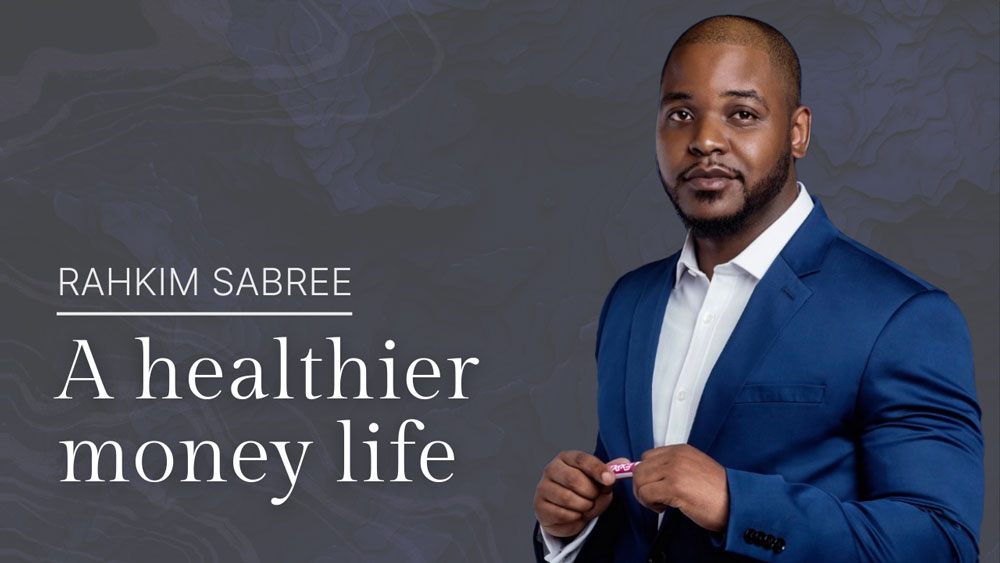Mahera Dutta
5
min read
Wealth Beyond Numbers: Insights from Financial Therapist Rahkim Sabree
Rahkim Sabree
Financial Therapist | Rahkim Sabree Financial Wellness
Key Takeaways
Entrepreneurs must tune in and think about their aspirations first. Even if it's at the cost of a few collaborations.
Surveys indicate people globally are battling financial stress. Financial therapy is a pioneering field that offers solutions.
Need to get in touch with a Financial Therapist? Learn what differentiates them from other mental health practitioners and financial advisors.
Forbes columnist and therapist Rahkim Sabree admits he’s being selfish. He’s learning to say no to collaborations or projects that fail to align with his goals. Prioritising himself is oddly satisfying.
“2024 is not the year to look for me to prove anything to anyone. 2024 is the year I prove everything to me,” his social media post reads.
A few minutes into a conversation with him, you will realize why he’s tuning out the rest of the world. He needs to focus. Rahkim cannot afford to lose time meeting somebody else’s deadlines and expectations. He has enough of his own. The stakes are high. Sabree is on a mission to popularise a kind of therapy few have known. Since 2019, he has been building his brand to advocate Financial Therapy, a gate-kept aspect of personal finance. This therapy involves merging finances with emotional support to help people deal with financial stress.
In April 2023, Bankrate surveyed adults in the U.S. to study money’s impact on mental health. The survey established the following:
82% of all U.S. adults who claimed money negatively impacted mental health said economic factors caused it.
Insufficient emergency savings was the top cited money-related issue impacting mental health.
59 % of those with household incomes less than $50,000 said they worry constantly. This is an increase of 11% from 2022.
Middle generations are stressed over money: 60% of Generation X (ages 43 to 58) and 55 % of millennials (ages 27 to 42) report that money is a source of stress.
To say Financial Therapy is the need of the hour is an understatement. In this conversation, Sabree delves into the importance of re-examining humanity’s relationship with money, his journey of becoming a successful entrepreneur with the hope of easing financial stress for others, and the characteristics of a good Financial Therapist.
On Finding His Way in a Saturated Industry
2019 was the advent of Rahkim’s brand. He played by the rule book to become a known personality in the world of finance. Sabree carefully curated his social media profile to discuss wealth management and attended the most sought-after podcasts to express his views. But deep down, he was restless. He knew his perspectives weren’t any different from the scores of financial advisors teaching people the art of managing money. He knew reinventing himself was a necessity.
And then, after much thought and experimentation, he decided to devote his energies to writing and launching his book ‘Financially Irresponsible.’ That’s when things began to change swiftly for Rahkim. Through the book, Sabree chose to speak about a theme few had tapped into. This was the mental and spiritual relationship people shared with money. As he began to speak intuitively about finance, he found a captivated audience. He had finally cemented authority in a crowded space. Awards followed recognising his contributions in this pioneering field. Sabree went on to bag a column for Forbes and his newsletter was thriving.
But this time, despite the accolades, another important goal remained unfulfilled: building revenue for himself and his company. “Okay, I am a thought leader in the space, I’ve done enough of the charity work, now it’s time for me to start eating off of this,” he remembered thinking to himself. Sabree knew what he was offering to the world was valuable. “Financially it doesn’t make sense to give away so much for free,” he says unabashedly. Rahkim realizes the importance of growing monetarily. He is a wise entrepreneur who is fending for himself. He sees no point in going back to a salaried job to feed his true passion, something most budding entrepreneurs resort to. His decisions resonate with an uncompromised commitment to Financial Therapy.
Understanding Financial Trauma
Rarely do we think about the reactions routine tasks like budgeting evoke within us. Do we feel positively towards it? Or do we hate to budget? Often, the gut-wrenching pain we feel when we can’t afford some things remains unacknowledged. These are the psychological effects of money that are often overlooked. Marketing gimmicks feed on scarcity. Thousands of dollars are being pumped into market research to trick humanity into believing their lives will be better if they purchase that one magic product. And one more. And another… How does one combat the feeling of lack each passing day?
Money dictates life. We’re earning it from 9-5, five days a week. It continues to hold a grip over us when we’re planning vacations. Even while escaping the drudgery of everyday life, money is something we can’t avoid.
To this end, Rahkim speaks about financial anxieties during holidays. He calls giving and receiving gifts ‘manipulative.’ “Do you expect that because you spent $100 for a gift for your partner, they do the same?” he asks rhetorically while talking about the intention behind gift-giving. This tradition has also seeped into corporate offices. “Some people feel real stress around that practice,” Rahkim says.
Exploring the intersection between money and psychology, Rahkim sheds light on prevailing money disorders. One will be surprised to learn how even the wealthy deal with financial insecurities.
Internal Family Systems, a psychotherapy centered around the belief that legacy burdens are powerful organizers of behaviors, has the scope of addressing this kind of deep-seated trauma. First-generation high-income earners, for instance, may resort to hoarding due to painful financial experiences in childhood.
The work of financial therapists is important in a world witnessing growing inequality. “Marginalised communities can overcome scarcity through education and high-paying careers yet they look for clues as to how the elite navigate their wealth,” Sabree notes in Rich People Have Scarcity Mindsets Too. Financial therapy aims to resolve these issues by helping people navigate their fears around money, enabling them to feel better about their financial decisions, self-esteem, and self-perception.
“Money is more than currency, it's more than what’s in your bank account. We have to recognize that money is energy” – Rahkim Sabree
On Becoming a Good Financial Therapist
“As a financial therapist, it is less about the numbers and more about the feelings,” reveals Rahkim. If people are having a hard time fulfilling a financial goal, it indicates a mismatch between their value systems and the desired goal, suggests Sabree.
So which professionals make for good financial therapists? There are different types of professionals working under this umbrella. These include financial planners, mental health practitioners, and financial coaches. A Financial therapist, nonetheless, must refrain from wearing too many hats. They must not waver from their focus on helping individuals alter their relationship with money. More importantly, ethical financial therapists can successfully point to their potential clients where their expertise ends.
As more people learn about Financial Therapy, they will realize the interplay of money and their emotions in a consumerist society driven by panic buying and selling. Good Financial Therapists will open your eyes to viewing money with a lens you’ve never worn. As for Rahkim, he will continue championing Financial Therapy and its role in helping people identify finance-induced trauma, supporting them on their healing journey.



